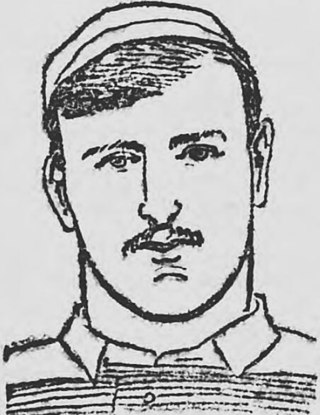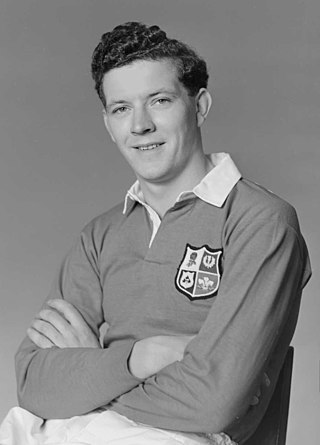
William Gwynn was a Welsh international rugby union forward who played club rugby for Swansea and would later become secretary of the Welsh Rugby Union. Gwynn was an all-round sportsman and as well as his success on the rugby pitch he also player cricket for Swansea, of which he became vice-president, and Glamorgan. Gwynn had also played association football and had captained Battersea College XI through two undefeated seasons. He would later become a referee and would officiate the very first football game between Swansea Town and Cardiff City.
David Onllwyn Brace was a Welsh international scrum-half who played club rugby for Newport and Aberavon. He won nine caps for Wales and would captain the team twice in the early 1960s. Brace was an exciting, unorthodox scrum-half, who epitomised the Welsh flair scrum-half, though his uneven international appearances point towards unhappiness in his match play from the Welsh selectors.
Iorwerth Isaac commonly known as Iorrie Isaac, was a Welsh dual-code international rugby union, and professional rugby league footballer who played in the 1930s. He played representative rugby union (RU) for Wales, and at club level for Pontypridd and Cardiff, as a flanker, and representative rugby league (RL) for Wales, and at club level for Leeds, as a prop or second-row.

Richard Hellings was an English-born Welsh rugby union forward who played international rugby for Wales and club rugby for Llwynypia. Hellings was noted for his strength built from years cutting coal as a Rhondda miner. Hellings later played rugby for Cardiff, Exeter and Devon.
Walter Vickery was an international rugby union back row who represented Wales and played club rugby for Aberavon. His father, George Vickery, also played for Aberavon and was also an international player, but he was capped for England.
Charles Henry Pugh was a Welsh international rugby union player who played rugby for three notable Welsh clubs, Aberavon, Maesteg and Neath. He was capped seven times for Wales and was part of the Welsh team that faced the touring 1924 New Zealand team.

Frederick Charles Parfitt was a Welsh international rugby union scrum-half who played club rugby for Newport, regional rugby for Somerset and was capped nine times for Wales. On retiring from rugby union, Parfitt switched to bowls and also represented Wales in this sport.

David Henry "Harry" Bowen was a Welsh international rugby union player who played club rugby for Llanelli and international rugby for Wales. After his retirement from playing he became a rugby administrator and referee. He is best remembered as a popular Llanelli captain, who scored the winning dropped goal against the 1888 touring New Zealand Māori.

| repyears1 = 1895–1900 | repcaps1 = 9 | reppoints1 = 0 | ru_ntupdate = | coachteams1 = | coachyears1 = | ru_coachupdate = | relatives = Norman Biggs, brother
Cecil Biggs, brother }}
David "Dai" Evans was a Welsh international rugby union forward who played club rugby for Penygraig and international rugby for Wales.
John Evans was a Welsh international rugby union forward who later 'went North', switching to the professional rugby league code. Evans played for several teams, but is most notable for playing club rugby for Llanelli, and international rugby for Wales.

Benjamin Davies was a Welsh international rugby halfback who played rugby union for Llanelli and was capped twice for Wales. Davies captained Llanelli for the 1894-95 season and was club secretary between 1898 and 1899. He later became the coach of Llandovery College and also wrote sports articles for the Daily Mail.
John "Jack" Rhapps was a Welsh international rugby union forward who played club rugby for Penygraig, and international rugby for Wales. Rhapps later "Went North", when he turned professional, joining rugby league team Salford, and along with Anthony Starks they became the World's first dual-code rugby internationals.

John "Jack" Elliott was a Welsh rugby union scrum-half who played club rugby for Cardiff and international rugby for Wales, winning three caps.
Robert Jones was a Welsh rugby union forward who played club rugby for Llwynypia and Cardiff and international rugby for Wales.
John "Bala" Jones was a Wales international rugby union scrum-half who played club rugby for Aberavon and Devonport Albion RFC and county rugby for Glamorgan and Devon. He won just a single international cap, in 1901.

Howell Jones was a Welsh rugby union forward who played for the rugby club Neath and county rugby for Glamorgan. He gained just a single cap for the Wales national team in 1904. Jones came from a sporting family, and his son, Howie Jones, also represented Wales in rugby union.

Ernest Raymond "Roy" John was a Wales and British Lions international rugby union lock. He played club rugby for Crynant and Neath. John was capped 19 times for Wales and was a member of two Grand Slam winning teams. In 1950 he was selected for the 1950 British Lions tour to New Zealand and Australia. John was an agile runner for a lock, but was most notable for his excellent ability in line-outs.
Clifford Williams was a Welsh international rugby union hooker who played club rugby most notably for Llanelli and Cardiff. Williams played two matches for Wales, against New Zealand in 1924 and England in 1925.
William Gwyn Hullin was a Welsh international rugby union scrum-half who played club rugby for Cardiff and London Welsh. He represented the Barbarians and played county rugby for Surrey and the London Counties. Hullin was capped only once for Wales, being unfortunate to be playing at the same time as Gareth Edwards, one of the greatest scrum-halves in world rugby. Despite his lack of international caps, he was a regular first team club player, and toured overseas, with Cardiff, London Welsh and the Barbarians. He was also a successful Sevens player, finishing in the winning team in both the Snelling Sevens and the Middlesex Sevens.
 England 1897
England 1897







